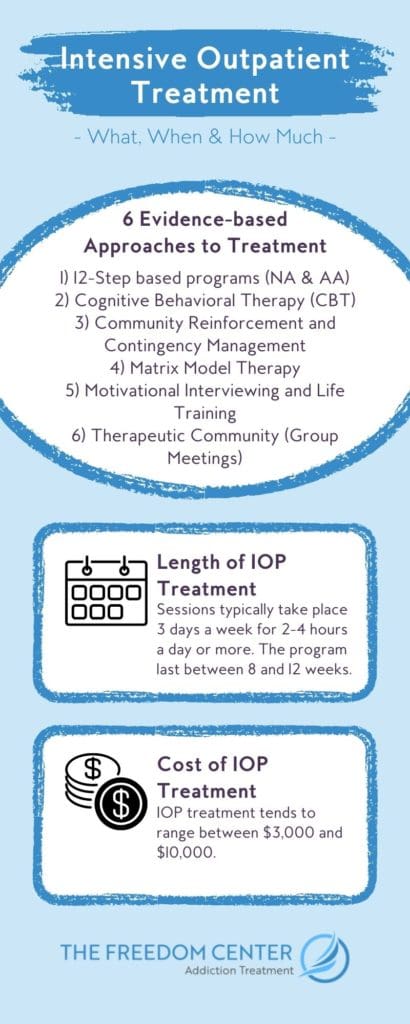Intensive outpatient treatment programs, also known as IOP, are typically cheaper and more cost-effective than traditional inpatient or residential addiction treatment options. In this type of program, patients do not reside onsite at the facility of an IOP treatment center which is the primary reason why the costs are significantly lower than inpatient or even partial hospitalization (PHP).
Intensive outpatient programs weren’t made just to be a “cheap rehab” option. They are thoughtfully designed programs meant to help recovering addicts transition from the structured support of intensive and PHP treatments back into society. The inherent nature of IOP, however, is what makes it a suitable alternative to pricier inpatient rehab programs without sacrificing support, structure, or effectiveness.

How Much Does IOP Cost?
The cost of an intensive outpatient program for drug and alcohol addiction tends to range between $3,000 and $10,000. Compare this to the typical costs of an inpatient treatment program that can start at $10,000 and the savings can be substantial.
Additionally, there are auxiliary costs that can make the total cost of IOP even lower. Because patients are not required to stay overnight at the facility, they can continue living independently with minimal disruption to their daily lives. By not staying on the premises, IOP patients can work during the day, preventing a loss of income; and time to take care of familial duties, saving money on childcare (i.e. babysitters, daycare, transportation to-and-from school), or taking care of sick or elderly family members (i.e. hospices, in-home caregivers)
How Much Time Does IOP Take?
Compared to traditional inpatient addiction treatment is more manageable for those with full-time work or family commitments. However, an IOP addiction treatment program can still be a significant time commitment. It can require 7-10 hours a week, and daily visits to the treatment center. Once you’re along in treatment, the daily counseling may be reduced to a few times a week (but this is up to the discretion of the program).
At the Freedom Center, IOP is comprised of group meetings, and counseling sessions are held at least 3 days a week for 2-4 hours a day or more. These sessions are available in the morning and night for your convenience. The standard duration of an IOP program is 8-12 weeks. It can go longer depending on a person’s specific needs, but can also be as short as 90 days.
How IOP Works
The major focus of intensive outpatient treatment is relapse prevention and how to transition from a life of addiction to one of sobriety. IOP utilizes a variety of different therapies to accomplish this. The core of treatment for many intensive outpatient programs like the one at The Freedom Center includes six evidence-based approaches that are proven effective over time. These include, but are not limited to:
- 12-Step based programs (Both NA and AA)
- Cognitive Behavioral Therapy (CBT)
- Community Reinforcement and Contingency Management
- Matrix Model Therapy
- Motivational Interviewing and Life Training
- Therapeutic Community (Group Meetings)
IOP: An Affordable (But Still Effective) Rehab Option
Even though intensive outpatient treatment for drug or alcohol addiction is far less expensive than inpatient rehab, the fact that IOP can be costly is a reality in the world we live in. Depending on several factors, such as the length of the program, quality of staff at the center, hours operated, and other qualities of care addiction treatment can cost hundreds to thousands of dollars per treatment episode.
If you need assistance paying for a Maryland intensive outpatient program, SAMHSA has provided a few standard tips to help you pay for intensive outpatient treatment below:
- Check your health insurance: You can call the number on the back of your card to get information about your mental health and substance abuse insurance coverage. You can find out what would be the additional costs, including deductible and insurance copayment amounts.
- Search for treatment programs that offer sliding fee scale or reduced payment options: Restrict a search in the national SAMHSA treatment directory for discounted services in IOP listings. This database can also be accessed via the substance abuse agency in your state, or call SAMHSA’s helpline at (1-800-662-HELP) and ask about affordable treatment options in your area.
- Inquire about scholarships and state-funded treatment: IOPs may receive federal grant money that can be used to fund your treatment. These vouchers are supervised by the state’s Department of Health and Human Services.











































